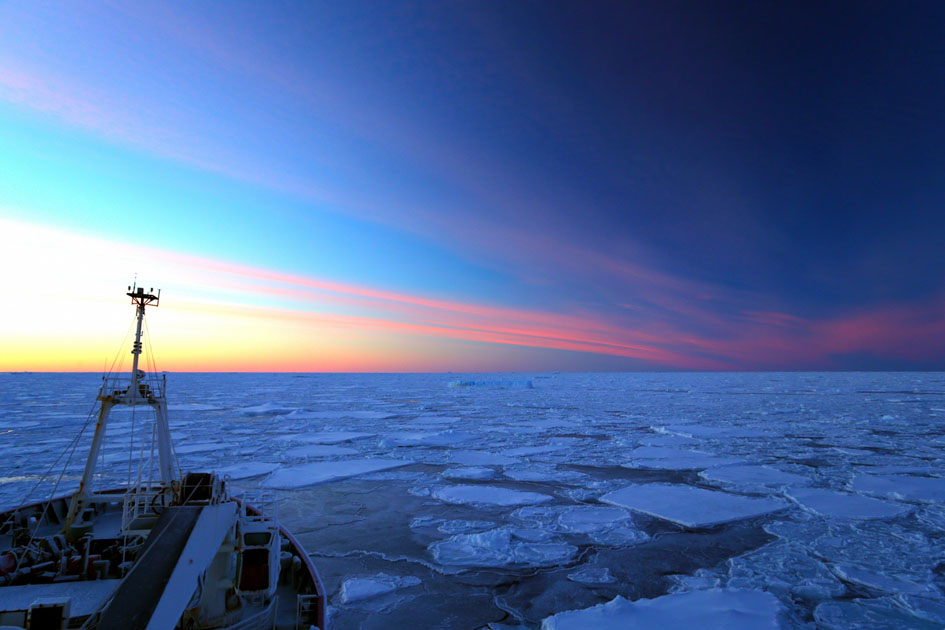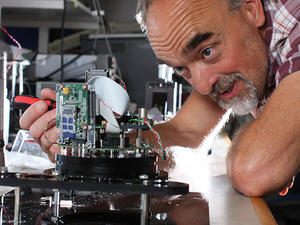
The human emission of carbon dioxide, largely from fossil fuel burning, will continue for the foreseeable future to be the most important cause of climate change. Only about half of our emissions are remaining in the atmosphere however. The other half is being absorbed, it is believed, in approximately equal amounts by vegetation on land and uptake by the ocean. These “natural sinks” of CO2 are consequently of huge value to us, since they slow the progress of climate change, so their present operation, and possible changes in future uptake of CO2, are a focus of intense research. The sink of CO2 into the ocean is today being observed by measurements of atmospheric and sea surface pCO2, the partial pressure of CO2 at the surface of the ocean. This controls the rate at which CO2 exchanges between the ocean and atmosphere, and which for this reason has been designated an “essential ocean variable” by the Global Ocean Observing System. These observations are usually made from commercial vessels, and where there are busy shipping routes, for example in much of the Atlantic and North Pacific Oceans, there are sufficient observations to describe the air-sea flux. However, there are other very large regions (the Indian, South Pacific and Southern Oceans for example) where we have woefully insufficient data.
In the future, this need could be met by autonomous surface vehicles (ASVs) making pCO2 measurements, and our proposal is to develop a pCO2 sensor specifically designed for ASVs. It will follow protocols that have been established by international bodies for the highest quality measurements suited to calculating the air-sea flux of carbon dioxide in the open ocean. The technical challenge is to adapt the successful principles of the instruments mounted in ships or on large buoys, where space and power are not limiting factors, to achieve the same high accuracy with small space and power footprint, resistance to violent motion, and long endurance, necessary on an ASV. We will achieve this by bringing together the extensive experience that the Exeter University group has in operating ship-based CO2 systems over 20 years, with improvements in engineering, utilising the experience and expertise of the NOC Technology and Engineering groups. We will use the basic measurement technique that has been well tested on the large instruments (equiibration of water with gas, and measurement of CO2 in gas by non-dispersive infra-red detection). However, we will use miniaturised components having small volumes and low flow rates of gas, enabling even a small instrument to carry on-board calibration gases. The specifications of the final instrument will include: endurance of up to a year and with frequency of measurements (both surface water and atmosphere) sufficient to define daily cycles, regular calibration using on-board calibration gases stored in miniature compressed gas cylinders, and measurement of CO2 in dried air which has equilibrated with surface water by direct contact. The instrument will also conform to data standards and integration protocols to enable the ready integration and exchange of sensors into autonomous platforms.
Planned Impact
The societal and economic impacts of the project will include, in the short to medium term the production of a product, “CaPASOS” which will be ready for licensing or other commercialisation route within 1 year of the end of the project. Product launch is expected to occur in 2021-22 with conservative expected sales exceeding 30 units by year 2 and a total 5 years sales total of 200 units (CAG of 30%). This will deliver jobs and income for the UK. We have interest in the potential commercialisation of the product illustrating a healthy engagement from the commercial sector. CaPASOS will be deployable on a wide range of USV MAS platforms, and will therefore support the growth of MAS observation systems. This will stimulate economic activity (e.g. business for MAS platform, sensors, systems and services companies). In the medium to longer term, the data returned from widespread CaPASOS enabled MAS will provide data directly to carbon flux assessments and data bases, particularly in areas where there are significant data gaps. This data will also inform biogeochemical models and process studies. This understanding will improve our knowledge of the ocean carbon sink and biogeochemical processes with impact on the UK’s and global management of climate change and marine resources. Therefore this data will assist evidence based decision by decision makers to manage the oceans and climate change.
This is a collaboration with the National Oceangraphy Centre and Plymouth Marine Laboratories and will run until June 2021.

Grant details: http://gotw.nerc.ac.uk/list_full.asp?pcode=NE%2FP020755%2F1&cookieConsent=A